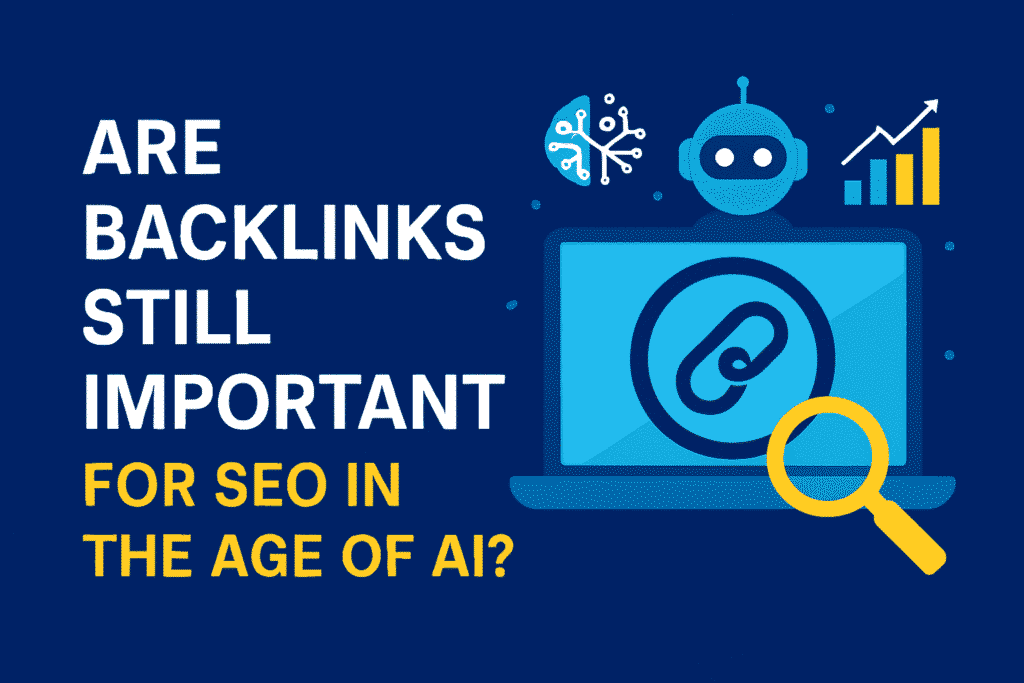
Contents
The rise of artificial intelligence (AI) in search engines has sparked a debate among SEO professionals: Do backlinks still matter?
For decades, backlinks have been the backbone of SEO. Google’s original PageRank algorithm relied heavily on them to determine a website’s authority. But with AI-driven updates like RankBrain, BERT, and Search Generative Experience (SGE), search engines now prioritize user intent, semantic understanding, and content quality over traditional ranking signals.
So, does this mean backlinks are obsolete? Not quite. While AI is reshaping SEO, linkbuilding remains a crucial factor—but its role is evolving. In this article, we’ll explore:
- The traditional importance of backlinks in SEO
- How AI is changing search rankings
- Why backlinks still matter (and how to adapt your strategy)
- The future of link building in an AI-powered SEO landscape
Let’s dive in.
The Traditional Role of Backlinks in SEO
What Are Backlinks?
Backlinks (or inbound links) are links from one website to another. They act as “votes of confidence”—the more high-quality backlinks a page has, the more authoritative Google considers it.
Why Were Backlinks So Important?
Google’s PageRank algorithm (1998) was built on the idea that links serve as endorsements. Key principles included:
- Authority Signals: Links from trusted sites (like Forbes or Harvard.edu) carried more weight.
- Trust & Credibility: A site with many spammy links could be penalized (Google Penguin updates targeted this).
- Discoverability: Backlinks helped Google crawl and index new pages.
Case Study: A 2020 Ahrefs study found that 90.63% of pages ranking in Google get zero traffic, but pages with backlinks have a significantly higher chance of ranking.
How AI Is Changing SEO
With AI, search engines are moving beyond simple link analysis. Here’s how:
A. AI-Powered Search Algorithms
- RankBrain (2015): Uses machine learning to interpret ambiguous queries.
- BERT (2019): Understands natural language and context.
- Search Generative Experience (SGE): AI-generated answers may reduce click-through rates to websites.
B. Shift from Links to User Intent & Content Depth
Google now prioritizes:
- Semantic search (understanding meaning, not just keywords).
- User engagement metrics (time on page, bounce rate).
- EEAT (Experience, Expertise, Authoritativeness, Trustworthiness).
C. The Rise of Zero-Click Searches
According to SparkToro, over 50% of Google searches end without a click—thanks to featured snippets and AI answers. This challenges the traditional value of backlinks for traffic.
Does this make backlinks irrelevant? Not entirely—but their role is changing.
Why Backlinks Still Matter (Even with AI)
Despite AI advancements, backlinks remain a core ranking factor. Here’s why:
A. Google Still Considers Backlinks a Key Ranking Signal
- John Mueller (Google) confirmed: “Links are still a strong ranking factor.”
- Google’s Search Quality Guidelines emphasize link quality when assessing expertise.
B. Backlinks = Authority & Trust
AI may understand content better, but it still needs external validation. High-quality backlinks act as:
- Trust signals (like academic citations).
- Proof of relevance (links from industry leaders matter more).
C. Referral Traffic & Brand Visibility
Even if rankings fluctuate, strong backlinks from high-traffic sites (e.g., news outlets, niche blogs) drive direct visitors.
D. Supporting E-E-A-T (Expertise, Experience, Authoritativeness, Trustworthiness)
Google’s AI evaluates content credibility, and backlinks from authoritative sources reinforce this.
Still not sure why backlinks matter? See Why Link Building is Important for SEO in 2025.
How Backlink Strategies Must Evolve for AI SEO
Old-school tactics (like directory submissions and spammy guest posts) no longer work. Instead, focus on:
A. Quality Over Quantity
- 1 authoritative backlink > 100 low-quality links.
- Avoid PBNs (Private Blog Networks)—Google’s AI detects them easily.
B. Natural Link Building Through High-Value Content
- Create link-worthy assets: Research studies, expert roundups, in-depth guides.
- Digital PR: Get featured in industry publications (e.g., HARO pitches).
C. Contextual Relevance Matters More Than Ever
- A backlink from a related niche site holds more weight than a generic one.
- Example: A fintech startup should aim for links from Finance Times, not a food blog.
D. Unlinked Brand Mentions & Indirect Signals
Google’s AI may consider:
- Brand mentions without links (could still imply authority).
- Social shares, citations in research papers.
Curious how to adapt your strategy? Check out The Best Link Building Strategies That Actually Work in 2025.
The Future of Backlinks in an AI-Dominated SEO World
Will AI Make Backlinks Obsolete?
- Unlikely, but their influence may decrease as AI weighs other factors.
- Possible scenarios:
- Google relies more on on-page engagement metrics.
- Backlinks become one of many trust signals, not the dominant one.
How SEOs Should Adapt
- Holistic SEO Approach: Combine backlinks with great content, UX, and technical SEO.
- Focus on EEAT: Build a strong brand presence beyond just links.
- Monitor AI Search Trends: Adjust strategies as SGE and AI answers evolve.
Conclusion
Backlinks aren’t dead—but their role in SEO is changing. While AI prioritizes user intent and content quality, backlinks remain a critical trust signal for Google.
Key Takeaways:
Backlinks still matter—Google and AI still use them to assess authority.
Focus on quality, not quantity—spammy links hurt more than they help.
Adapt to AI SEO by combining backlinks with EEAT, content depth, and UX.
What’s Next?
If you want to future-proof your backlink strategy, focus on:
- Earning links naturally through expert content.
- Building a strong brand that attracts mentions.
- Staying updated on AI-driven SEO changes.
